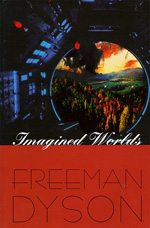【英語で読む!講座】 Imagined Worlds (科学の未来)
僕のアカデミックな活動は、「概念」、「方法」、「道具」をつくる、という3つの軸で構成されている(過去にも少しだけ書いたことがあるので、こちらを参照)。
これに3つの軸に関連する話題として、科学革命に関するフリーマン・ダイソン(Freeman Dyson)の分類がある。ダイソンは、科学革命を、「概念による科学革命」(concept-driven revolution)と「道具による科学革命」(tool-driven revolution)の二つに分けて考えることが重要だと指摘している。今回は、その話を取り上げることにしたい。
 Freeman Dyson, Imagined Worlds
Freeman Dyson, Imagined Worlds , Harvard University Press, 1997
, Harvard University Press, 1997
今回取り上げるのは、この本の第2章"SCIENCE" の部分。
邦訳は、『科学の未来』 (フリーマン・ダイソン, はやし・はじめ, はやし・まさる (訳), みすず書房, 2005)。
(フリーマン・ダイソン, はやし・はじめ, はやし・まさる (訳), みすず書房, 2005)。
以下で取り上げる訳文は、この邦訳本より。
この本は、以前、同僚の内藤さんに教えてもらったのだが、まさに僕の興味にドンピシャだった(内藤さん、ありがとう)。
"scientific revolution"は、言うまでもなく「科学革命」。科学者たちの拠って立つ「パラダイム」(paradigm)が変化すること。
ダイソンによると、"scientific revolution"には、"concept-driven"のものと、"tool-driven"のものがあるというわけだ。邦訳書では、「概念によって推し進められる革命」や「道具によって推し進められる革命」と訳されているが、僕は短く「概念による科学革命」と「道具による科学革命」と訳すことにしたい。もちろん "-driven" なので、「~による」は「~によって推し進められる」というニュアンス。
"-driven"という言い方で僕が思い出すのが、ソフトウェア分野の"Event-Driven ~"(イベントドリブン~, イベント駆動~)や"Model-Driven Architecture"(モデル駆動アーキテクチャ)など。「駆動」と訳されることが多いが、「○○ドリブン」というふうに言うことも多い。
さて、話を戻すと、科学革命というので有名なのは、科学哲学者のトーマス・クーン(Thomas Kuhn)。クーンのいう科学革命はどう位置づけられるのだろうか。
それでは、概念による科学革命と、道具による科学革命の具体例としてはどういうものがあるのだろうか。
"advent"は、「出現」、「到来」の意味。"the advent of ~"(~の出現, ~の到来)として使う。
"revolutionize ~"は、「~に大変革をもたらす」、「~を激変(一変)させる」、「~根底(根本)から変える」ということ。一度使ってみたいかっこいい言葉だ。
道具による科学革命は、どのような分野で起きてきたのだろうか。
"preponderance"は、訳文にあるように「優位」だが、「重さ(力, 重要性, 数量など)で勝ること」や「優勢」というニュアンス。本質的にそうだ、というよりも、結果的に現状ではこうなっているという感じだろう。
ダイソンの分類でいうならば、僕は、社会科学において道具による科学革命が必要だと思っている。そして、ニクラス・ルーマンが社会学におけるconcept-drivenの革命を引き起こしたのに対して、僕はどちらかというと、tool-drivenの方を目指したいと思っているのだ。
これに3つの軸に関連する話題として、科学革命に関するフリーマン・ダイソン(Freeman Dyson)の分類がある。ダイソンは、科学革命を、「概念による科学革命」(concept-driven revolution)と「道具による科学革命」(tool-driven revolution)の二つに分けて考えることが重要だと指摘している。今回は、その話を取り上げることにしたい。
 Freeman Dyson, Imagined Worlds
Freeman Dyson, Imagined Worlds今回取り上げるのは、この本の第2章"SCIENCE" の部分。
邦訳は、『科学の未来』
以下で取り上げる訳文は、この邦訳本より。
この本は、以前、同僚の内藤さんに教えてもらったのだが、まさに僕の興味にドンピシャだった(内藤さん、ありがとう)。
"There are two kinds of scientific revolutions, those driven by new tools and those driven by new concepts."(p.49)
「科学革命には二つの種類がある。新しい道具によって推し進められるものと、新しい概念によって推し進められるものだ。」(邦訳 p.49)
"The effect of a concept-driven revolution is to explain old things in new ways. The effect of a tool-driven revolution is to discover new things that have to be explained."(p.50)
「概念によって推し進められた革命の効果は、昔ながらの物事を新しい仕方で説明することにある。道具によって推し進められた革命の効果は、説明すべき新しい物事を発見することにある。」(邦訳 p.50)
"scientific revolution"は、言うまでもなく「科学革命」。科学者たちの拠って立つ「パラダイム」(paradigm)が変化すること。
ダイソンによると、"scientific revolution"には、"concept-driven"のものと、"tool-driven"のものがあるというわけだ。邦訳書では、「概念によって推し進められる革命」や「道具によって推し進められる革命」と訳されているが、僕は短く「概念による科学革命」と「道具による科学革命」と訳すことにしたい。もちろん "-driven" なので、「~による」は「~によって推し進められる」というニュアンス。
"-driven"という言い方で僕が思い出すのが、ソフトウェア分野の"Event-Driven ~"(イベントドリブン~, イベント駆動~)や"Model-Driven Architecture"(モデル駆動アーキテクチャ)など。「駆動」と訳されることが多いが、「○○ドリブン」というふうに言うことも多い。
さて、話を戻すと、科学革命というので有名なのは、科学哲学者のトーマス・クーン(Thomas Kuhn)。クーンのいう科学革命はどう位置づけられるのだろうか。
"Thomas Kuhn in his famous book, The Structure of Scientific Revolutions, talked almost exclusively about concepts and hardly at all about tools. "(p.49)
「トーマス・クーンは、有名な『科学革命の構造』で、ほとんどもっぱら、概念について語っており、道具についてはほとんど語っていない。」(邦訳 p.49)
"His idea of a scientific revolution is based on a single example, the revolution in theoretical physics that occurred in the 1920s with the advent of quantum mechanics. This was a prime example of a concept-driven revolution. Kuhn's book was so brilliantly written that it became an instant classic. It misled a whole generation of students and historians of science into believing that all scientific revolutions are concept-driven."(p.50)
「クーンの考える科学革命の概念は、ただ一つの例にもとづいている。それは、一九二〇年代に起こった理論物理学の革命である。概念によって推し進められる革命の格好の例だ。クーンの本はその見事な筆致のため、たちまち古典的名著となった。この本のおかげで、まるまる一世代の科学研究者と科学史家が、科学革命はすべて概念によって推し進められると誤って信じた。」(邦訳 p.49)
"The concept-driven revolutions are the ones that attract the most attention and have the greatest impact on the public awareness of science, but in fact they are comparatively rare."(p.50)
「概念によって推し進められる革命は、最も注目され、一般の人々が科学について抱いている意識に最も大きなインパクトを与えるが、こういう革命は比較的まれなのだ。」(邦訳 p.49)
それでは、概念による科学革命と、道具による科学革命の具体例としてはどういうものがあるのだろうか。
"In the last 500 years, in addition to the quantum-mechanical revolution that Kuhn took as his model, we have had six major concept-driven revolutions, associated with the names of Copernicus, Newton, Darwin, Maxwell, Freud, and Einstein."(p.50)
「この五〇〇年の間に、クーンがモデルとした量子力学革命のほかに、概念によって推し進められる大きな革命が六つ起こった。それぞれ、コペルニクス、ニュートン、ダーウィン、マクスウェル、フロイト、アインシュタインの名前と結びついている。」(邦訳 p.50)
"During the same period there have been about twenty tool-driven revolutions, not so impressive to the general public but of equal importance to the progress of science."(p.50)
「同じ時期に道具によって推し進められる革命は二〇ほど起こった。一般大衆にはそれほど強い印象を与えないが、科学の進歩にとっては同じくらい重要である。」(邦訳 p.49)
"Two prime examples of tool-driven revolutions are the Galilean revolution resulting from the use of the telescope in astronomy, and the Crick-Watson revolution resulting from the use of X-ray diffraction to determine the structure of big molecules in biology."(p.50)
「道具によって推し進められる革命の格好の例に、天文学で望遠鏡を使うようになったことから生じたガリレオ革命と、生物学で高分子の構造を特定するのにX線回析を使うようになったことから生じたクリック-ワトソン革命がある。」(邦訳 p.50)
"After the Crick-Watson revolution of the 1950s, the next great tool-driven revolution was the advent of electronic computers and memory banks in the 1960s. Electronic data processing revolutionized every branch of experimental science, while electronic computer simulations revolutionized every branch of theoretical science. Both the Crick-Watson and the computer revolutions were driven by tools imported from physics."(p.51)
「一九五〇年代のクリック-ワトソン革命の次に起こった、道具によって推し進められた大きな革命は、一九六〇年代の電子式コンピューターとメモリーバンクの登場だった。電子データ処理は、実験科学のあらゆる分野を革命的に変え、電子式コンピューター・シミュレーションは、理論科学のあらゆる分野を革命的に変えた。クリック-ワトソン革命もコンピューター革命も物理学から輸入された道具によって推し進められた。」(邦訳 p.50)
"advent"は、「出現」、「到来」の意味。"the advent of ~"(~の出現, ~の到来)として使う。
"revolutionize ~"は、「~に大変革をもたらす」、「~を激変(一変)させる」、「~根底(根本)から変える」ということ。一度使ってみたいかっこいい言葉だ。
道具による科学革命は、どのような分野で起きてきたのだろうか。
"In almost every branch of science, and especially in biology and astronomy, there has been a preponderance of tool-driven revolutions."(p.51)
「科学のほとんどあらゆる分野で、とりわけ生物学と天文学では、道具によって推し進められた革命が優位を保ってきた。」(邦訳 p.50)
"We have been more successful in discovering new things than in explaining old ones. In recent times my own field of physics has had great success in creating new tools that have started revolutions in biology and astronomy. Physics has been less successful in creating new concepts with which to understand its own discoveries."(p.51)
「最近、私の専門である物理学は、諸々の新しい道具をつくりだすのに大きな成功を収め、それが生物学と天文学で革命を引き起こしてきた。一方、物理学自身の発見を理解する助けとなる新しい概念をつくりだすことには、それほどの成功を収めてこなかった。」(邦訳 p.50)
"preponderance"は、訳文にあるように「優位」だが、「重さ(力, 重要性, 数量など)で勝ること」や「優勢」というニュアンス。本質的にそうだ、というよりも、結果的に現状ではこうなっているという感じだろう。
ダイソンの分類でいうならば、僕は、社会科学において道具による科学革命が必要だと思っている。そして、ニクラス・ルーマンが社会学におけるconcept-drivenの革命を引き起こしたのに対して、僕はどちらかというと、tool-drivenの方を目指したいと思っているのだ。
英語漬け生活 | - | -